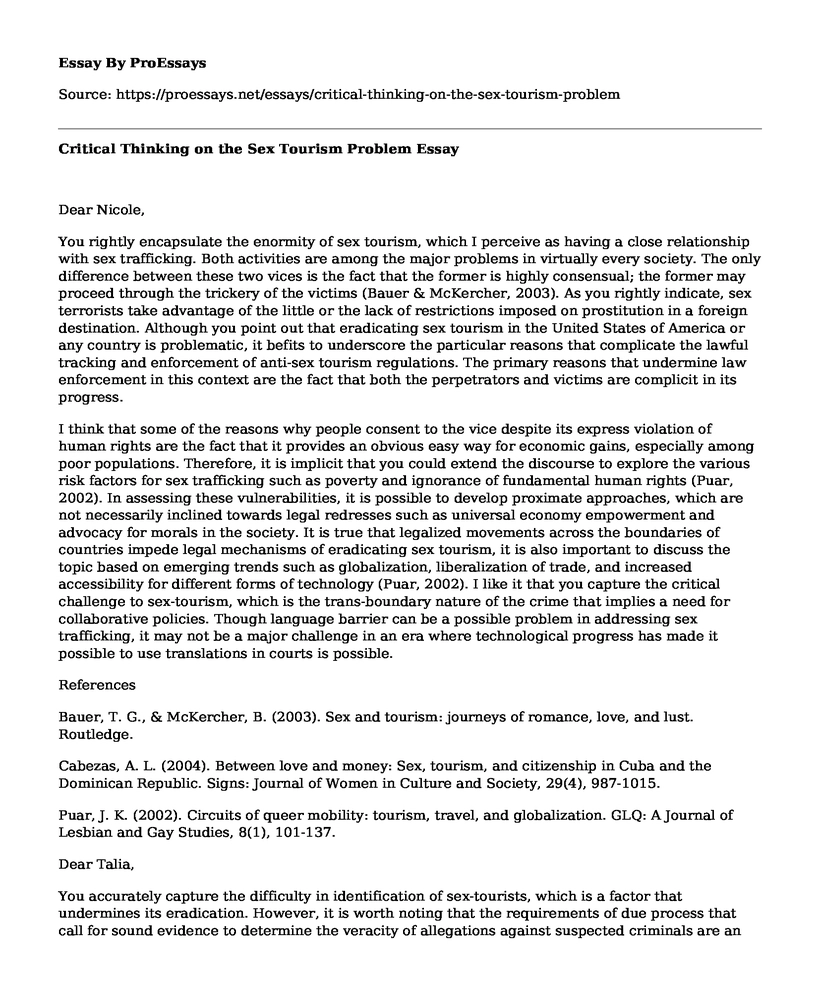Dear Nicole,
You rightly encapsulate the enormity of sex tourism, which I perceive as having a close relationship with sex trafficking. Both activities are among the major problems in virtually every society. The only difference between these two vices is the fact that the former is highly consensual; the former may proceed through the trickery of the victims (Bauer & McKercher, 2003). As you rightly indicate, sex terrorists take advantage of the little or the lack of restrictions imposed on prostitution in a foreign destination. Although you point out that eradicating sex tourism in the United States of America or any country is problematic, it befits to underscore the particular reasons that complicate the lawful tracking and enforcement of anti-sex tourism regulations. The primary reasons that undermine law enforcement in this context are the fact that both the perpetrators and victims are complicit in its progress.
I think that some of the reasons why people consent to the vice despite its express violation of human rights are the fact that it provides an obvious easy way for economic gains, especially among poor populations. Therefore, it is implicit that you could extend the discourse to explore the various risk factors for sex trafficking such as poverty and ignorance of fundamental human rights (Puar, 2002). In assessing these vulnerabilities, it is possible to develop proximate approaches, which are not necessarily inclined towards legal redresses such as universal economy empowerment and advocacy for morals in the society. It is true that legalized movements across the boundaries of countries impede legal mechanisms of eradicating sex tourism, it is also important to discuss the topic based on emerging trends such as globalization, liberalization of trade, and increased accessibility for different forms of technology (Puar, 2002). I like it that you capture the critical challenge to sex-tourism, which is the trans-boundary nature of the crime that implies a need for collaborative policies. Though language barrier can be a possible problem in addressing sex trafficking, it may not be a major challenge in an era where technological progress has made it possible to use translations in courts is possible.
References
Bauer, T. G., & McKercher, B. (2003). Sex and tourism: journeys of romance, love, and lust. Routledge.
Cabezas, A. L. (2004). Between love and money: Sex, tourism, and citizenship in Cuba and the Dominican Republic. Signs: Journal of Women in Culture and Society, 29(4), 987-1015.
Puar, J. K. (2002). Circuits of queer mobility: tourism, travel, and globalization. GLQ: A Journal of Lesbian and Gay Studies, 8(1), 101-137.
Dear Talia,
You accurately capture the difficulty in identification of sex-tourists, which is a factor that undermines its eradication. However, it is worth noting that the requirements of due process that call for sound evidence to determine the veracity of allegations against suspected criminals are an impediment to the prosecution of the crime (Cabezas, 2009). In other words, it is imperative to state that the bureaucracy of the American criminal justice process is itself a limiting factor in eliminating sex tourism (Reichel, 2002). You explicitly point out how different vulnerabilities in the society including poverty provide a suitable environment for the thriving of the vice (Zhang, Temmerman, Li, Y., Luo & Luchters, 2012). Therefore, an elaborate assessment of the problem and its entrenchment in the American society requires developing a succinct relationship between it and the social and economic weakness I like the way you bring out how economic factors promotes the aggression of perpetrators as well as increasing the vulnerability of sex-tourists.
Despite the fact that poverty and government laxity to eliminate sex-tourism may be a possible cause of its proliferation, it is not applicable in the context of the United States. Cracking on the perceived perpetrators of sex-tourism as you propose is an important consideration, but this must be not only progressive but also reliant on enforcement of existing anti-sex tourism. Therefore, it is important to interrogate the relevance of the available anti-sex tourism laws to determine their applicability within the current trends (Healy, 1994).
References
Cabezas, A. L. (2009). Economies of desire: Sex and tourism in Cuba and the Dominican Republic. Temple University Press.
Healy, M. A. (1994). Prosecuting Child Sex Tourists at Home: Do Laws in Sweden, Australia, and the United States Safeguard the Rights of Children as Mandated by International Law. Fordham Int'l LJ, 18, 1852.
Reichel, P. L. (2002). Comparative criminal justice systems: A topical approach. Upper Saddle River, NJ: Prentice Hall.
Zhang, X. D., Temmerman, M., Li, Y., Luo, W., & Luchters, S. (2012). Vulnerabilities, health needs and predictors of high-risk sexual behaviour among female adolescent sex workers in Kunming, China. Sexually transmitted infections, sextrans-2012.
Cite this page
Critical Thinking on the Sex Tourism Problem. (2021, Jun 18). Retrieved from https://proessays.net/essays/critical-thinking-on-the-sex-tourism-problem
If you are the original author of this essay and no longer wish to have it published on the ProEssays website, please click below to request its removal:
- Personal Reflection on English 101 Course
- Women's Indian Captivity Narratives - Essay Sample
- Auntie, I'm Fighting for My Masters Degree! - Paper Example
- Research Paper on Illegal Immigration in America: 3.3% of Population and Rising
- Essay on the Unrewarded Labor of African Americans: A Trace of Economic History
- Essay on Bullying: A Common Yet Damaging Form of School Violence
- Paper Example on Developmental Assets: Infusing Quality & Experience in Youth Programs







